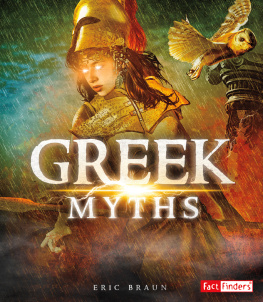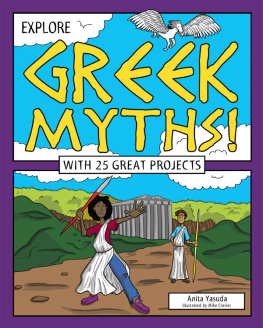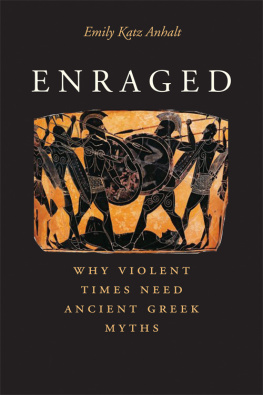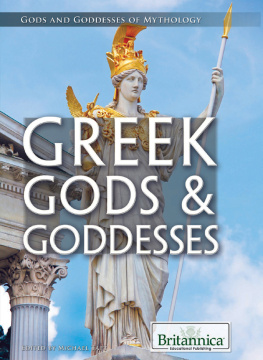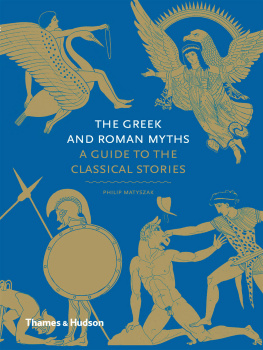Emily Katz Anhalt - Embattled : how ancient Greek myths empower us to resist tyranny
Here you can read online Emily Katz Anhalt - Embattled : how ancient Greek myths empower us to resist tyranny full text of the book (entire story) in english for free. Download pdf and epub, get meaning, cover and reviews about this ebook. year: 2021, genre: Romance novel. Description of the work, (preface) as well as reviews are available. Best literature library LitArk.com created for fans of good reading and offers a wide selection of genres:
Romance novel
Science fiction
Adventure
Detective
Science
History
Home and family
Prose
Art
Politics
Computer
Non-fiction
Religion
Business
Children
Humor
Choose a favorite category and find really read worthwhile books. Enjoy immersion in the world of imagination, feel the emotions of the characters or learn something new for yourself, make an fascinating discovery.

- Book:Embattled : how ancient Greek myths empower us to resist tyranny
- Author:
- Genre:
- Year:2021
- Rating:5 / 5
- Favourites:Add to favourites
- Your mark:
- 100
- 1
- 2
- 3
- 4
- 5
Embattled : how ancient Greek myths empower us to resist tyranny: summary, description and annotation
We offer to read an annotation, description, summary or preface (depends on what the author of the book "Embattled : how ancient Greek myths empower us to resist tyranny" wrote himself). If you haven't found the necessary information about the book — write in the comments, we will try to find it.
Embattled : how ancient Greek myths empower us to resist tyranny — read online for free the complete book (whole text) full work
Below is the text of the book, divided by pages. System saving the place of the last page read, allows you to conveniently read the book "Embattled : how ancient Greek myths empower us to resist tyranny" online for free, without having to search again every time where you left off. Put a bookmark, and you can go to the page where you finished reading at any time.
Font size:
Interval:
Bookmark:

EMBATTLED
How Ancient Greek Myths Empower Us to Resist Tyranny
Emily Katz Anhalt
REDWOOD PRESS
Stanford, California
STANFORD UNIVERSITY PRESS
Stanford, California
2021 by Emily Katz Anhalt. All rights reserved.
No part of this book may be reproduced or transmitted in any form or by any means, electronic or mechanical, including photocopying and recording, or in any information storage or retrieval system without the prior written permission of Stanford University Press.
Printed in the United States of America on acid-free, archival-quality paper
Library of Congress Cataloging-in-Publication Data
Names: Anhalt, Emily Katz, author.
Title: Embattled : how ancient Greek myths empower us to resist tyranny / Emily Katz Anhalt.
Description: Stanford, California : Redwood Press, 2021. | Includes bibliographical references and index.
Identifiers: LCCN 2021000152 (print) | LCCN 2021000153 (ebook) | ISBN 9781503628564 (cloth) | ISBN 9781503629400 (ebook)
Subjects: LCSH: Epic poetry, GreekThemes, motives. | Greek drama (TragedyThemes, motives. | Mythology, GreekPolitical aspects. | Power (Social sciences) in literature. | Democracy in literature.
Classification: LCC PA3092 .A545 2021 (print) | LCC PA3092 (ebook) | DDC 883/.010943219dc23
LC record available at https://lccn.loc.gov/2021000152
LC ebook record available at https://lccn.loc.gov/2021000153
Cover design: Kevin Barrett Kane
Cover image: Bronze cuirass (body armor), 4th century BCE, The Met,
Gift of Este Lauder Inc., 1992.
Text design: Kevin Barrett Kane
Typeset at Stanford University Press in 10/15 ITC Galliard Pro
For my mother, Marilyn Ogus Katz (19332017)
Contents
A Note on the Text, Translations, and Endnotes
All adaptations, translations, and citations of the Iliad, Odyssey, Oresteia, and Antigone throughout this book are my own and derive from the Oxford Classical Texts of D. B. Monro and T. W. Allen (Iliad), T. W. Allen (Odyssey), D. Page (Oresteia), and A. C. Pearson (Antigone).
Homeric Greek is a literary composite of several dialects: primarily Aeolic and old-Ionic, with some Arcado-Cyprian, Attic, and non-Greek forms as well as some neologisms. This combination would have sounded somewhat strange and elevated even to audiences in the sixth and fifth centuries BCE. Sections of the tragedies also very likely sounded formal and stilted to their original audiences in the fifth century BCE. I have tried to paraphrase and, at times, to translate the Greek (into prose, not poetry) as literally as possible, while still yielding sense in English. When possible, I have sought to preserve some of the distance and elevated tone of the original Greek, particularly in passages of dialogue. To a contemporary reader, this may sound awkward at times.
Given the vastness of the scholarly bibliography, the endnotes, while undeniably exhausting, are far from exhaustive. Rather, I have aimed to offer a representative sample of relevant scholarship in English and to provide an impetus to further reading.
INTRODUCTION
CONFRONTING TYRANNY TODAY
Imagine a cool, overcast spring afternoon with a sharp breeze cutting through the branches of the olive trees. Sitting in the theater at Athens, you watch, apprehensively, as a father greets his son before the dark gates of an immense palace. The father is Creon, the new king of Thebes. He has condemned to death a young woman named Antigone, because she violated his ban on burying the body of a traitor. The son is Haemon, Antigones fianc. He has come to beg his father to spare the young womans life. King Creons elderly advisors anxiously watch and wait.
The son begins respectfully. With utmost tact, he insists that he values his fathers success above all. He urges his father to be open to good advice: Anyone who thinks that he alone has the capacity for thought or eloquence or reason, well, these men, once unfolded, are seen to be empty. Theres nothing shameful in learning new things, Haemon explains. Trees that can bend survive storms, he points out. Whoever guides a ship but fails to loosen the sheet when necessary overturns his ship. Haemon implores his father to yield, and to stop being angry. He admits that he himself is young, but even an old person cant be right all the time and can learn from someone who speaks well.
The chorus of elderly advisors agrees. They think that both men can learn from one another.
But Creon reacts with astonishing and terrifying fury. So at our age we will be taught to understand nature by a man of his age? he asks. Does Haemon advise him to honor people who produce disorder? Hasnt Antigone been seized with just such a sickness?
Haemon manages to keep his voice calm. He points out that all the citizens are on his side.
Creon retorts that he is in charge, not the people. He confidently asserts that he rules exclusively in his own interest, since the city belongs to its ruler and to no one else.
Haemon now begins to lose control, too. Criticizing his father for sounding childish, he exclaims, A city that belongs to one man is not a city!
King Creon finds Haemons statement incomprehensible. Isnt the city thought to belong to the one who rules it? he demands.
Alone, you would rule nobly over a deserted land, Haemon sneers. But he continues to insist that he only wants to prevent his father from committing an injustice.
Disparaging his son as a womans slave, Creon remains enraged that his son dares to criticize his fathers knowledge of justice and his confidence in his own authority.
Haemon argues that Creon is dishonoring the gods and is thereby endangering himself along with his son and his sons fiance.
Creon proceeds to denounce his son as a polluted character. Deaf to Haemons arguments, he screams, You will never marry this woman while she is living!
She will die, then, Haemon acknowledges. And by dying, she will kill someone else.
How dare you threaten me! Creon cries.
Im not threatening you, just telling you my intention. Haemon intends to kill himself. He condemns his fathers inability to listen, and he suggests that he is not thinking well.
The king responds with monstrous ferocity. You know what? he says. You can watch her die. He orders Antigone to be brought forward so that Haemon can be present at her death.
Dont expect me to watch her die, Haemon announces. And you will never see me again. Go ahead and rave on among whoever of your friends are willing. He stresses the word philoi (friends) ironically. Philoi also means blood relatives, but Creon has reduced it to mean only political supporters. This misguided assessment has perverted the kings relationship with his own son. You, the audience, and the kings elderly advisors all watch in horror as Haemon rushes away. They know that Creons treatment of a traitor and a rebel aligns with standard practice. You know that this story is not going to end well.
TYRANNY BEGINS and ends in violence, intimidation, and oppression. The brutality and greed of individuals wielding unfettered power, and their replacement by equally brutal and rapacious successors, whether by violence or by other means, inevitably fractures and crushes the community. In English, tyranny is more or less synonymous with despotism, and in this book I use the two terms interchangeably to refer to abusive, unrestrained, and unaccountable power. Abuses of powerwhether by one person, a few, or manydestroy individuals and corrode communities.
Font size:
Interval:
Bookmark:
Similar books «Embattled : how ancient Greek myths empower us to resist tyranny»
Look at similar books to Embattled : how ancient Greek myths empower us to resist tyranny. We have selected literature similar in name and meaning in the hope of providing readers with more options to find new, interesting, not yet read works.
Discussion, reviews of the book Embattled : how ancient Greek myths empower us to resist tyranny and just readers' own opinions. Leave your comments, write what you think about the work, its meaning or the main characters. Specify what exactly you liked and what you didn't like, and why you think so.

